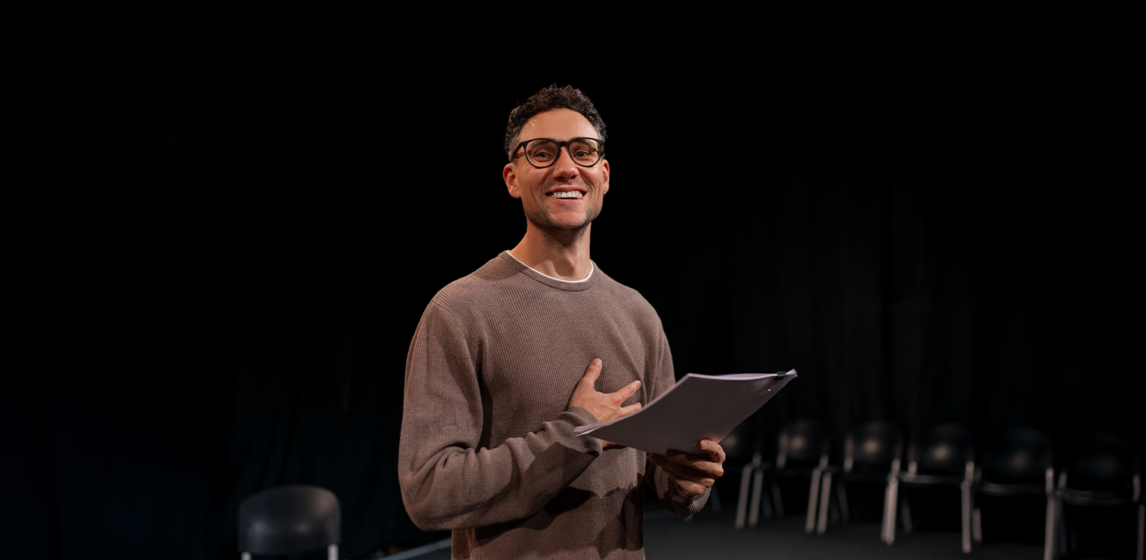5 tips to rethink the strengths and gifts of youth with disabilities in your ministry
 Deborah Huggins | Apr 1, 2022
Deborah Huggins | Apr 1, 2022
Twenty-six percent of Americans have an identified disability—it’s the biggest minority group in our country.
We all have teenagers in our youth programs who receive supports and services for disabilities. Figuring out the best ways to include these amazing young people in our programs, to help them connect with peers and friends, and to share their gifts and strengths with the church is part of the joy and challenge of youth ministry. When we work with a team, communicate with people with disabilities and their support network, and take a strengths-based approach, we find that God has even more amazing plans for our ministry with youth with disabilities than we could have imagined!
As you serve young people with disabilities on their journey of identity, belonging, and purpose, these five tips can help you develop a strengths-based approach.
1. God created us different for a reason
I love mosaics. I like the rustic ones made out of broken pottery or bottle caps, and the intricate ones made of painted tiles. Mosaics are so cool because at first you notice each individual piece—but when you step back, you can see the big picture.
They also help me understand how God “created humankind in his image[1]…” and what that means about God. Theologians explain to us that being created in the image of God (imago Dei) means that if we can really understand each other (the reflections), that we can start to understand what is reflected—that we can better understand God.[2]
When I think about faith inclusion, I start to think about the pieces of the mosaic that get filled in with every single person who takes a risk and walks into the doors of our churches. I think about every mom willing to advocate for turning off old, buzzing overhead lights, so that her child can be a part of Sunday School and how she is filling in a piece of the mosaic, and every young person willing to share a different perspective—a different view of God. I am so grateful to the people in my ministry who are willing to help me fill in this beautiful picture—a picture of all of humanity that helps me to better understand God’s beauty, glory and grace.
Practical tip: In your program welcome cards or registration materials, make sure ask about strength as well as a needs inventory. For example, in addition to asking about medical or behavioral supports, you might add the question, “what are you/is your child passionate about or interested in? What are your/their current areas of leadership?”
2. We all need supports—and those don’t cancel out our strengths
I am terrible at finding my car in a parking lot. It’s a limitation. We all have them. Mine is kind of a family joke, but after a few times circling the parking lot, my daughter started keeping track of my car for me. She was 3. When I don’t have her with me, it can take me a long time to find my car. My daughter is an informal support. She’s someone in my environment who can offer me support without getting trained or paid to do it.
We all rely on these kinds of supports. Maybe you set an alarm on your phone to help you leave in the morning, or maybe you use glasses, or you have a roommate who always reminds you to take out the trash. Being aware of our own many supports helps us to think about how to accept and give support in our churches—and it helps us to see that just because a young person needs a support doesn’t mean that they don’t also have gifts to share.
Research in disability shows us that peers are one of the most effective means of providing informal supports for people with disabilities—and that the partnership benefits both the young person with a disability and their peer buddy.[3] Peer supports also fit in well in most of our ministry contexts. As you think about designating a peer buddy, make a plan that supports both members of the pair for success by linking them with a knowledgeable adult or older peer mentor.
Practical tip: Build trust with your students’ existing support teams. The more trust you nurture with family, friends, and paid staff, the better their communication with you will be, and the more likely you are to know the best responses to offer. Be sure to learn the name of support staff members, offer them a cup of coffee or drink of water, and get to know them while recognizing that they might not be comfortable joining in completely.
3. Focus on the strengths—not the deficits
Temple Grandin, professor, best-selling author, world-renowned disability expert, and person with Autism Spectrum Disorder (ASD), urges people with disabilities and the people who support them to focus on and to nurture strengths. The deficits are obvious, she says, but strengths are the things that lead to passion, joy, and independence.
Chances are you are already pretty good at nurturing leaders in your youth programs. You are used to seeing natural leaders, organizers, and kids with a passion for Christ. I encourage you to start thinking about yourself as a “strengths and passions detective”—to start praying about what those strengths are, and how to nurture them—especially for kids with less obvious talents and gifts as leaders. Finding and affirming strengths is a powerful part of our work with youth.
Practical tip: When you have conversations with a young person with a disability, their support team, and friends, listen for strengths and gifts, and pray about how to bring those interests into your programs.
4. Plan for leadership
Research shows that people with disabilities feel like they belong in faith communities when they are in positions of leadership. As youth workers, we are constantly finding big and small ways for kids to share their gifts with the church. It’s no different for kids with disabilities.
You may need to rethink what a leader looks like: it may mean co-leading or supported leadership, or it might mean that you need to get a little creative at finding a place to let someone shine, but putting in the effort to accommodate for that experience can pay off in huge ways in the life of a person with a disability and for every single kid in your group.
Practical tip: Plan for leadership, but with flexibility. If a young person is having an off day, make sure that it’s easy for them to back out of leadership.
5. Inclusion matters to every single kid in your church.
Every kid feels different and struggles with a sense of belonging, who they are, and what their purpose is. When we model inclusive practices, we are saying to every single kid in the room that they belong—that they have a place. According to Reynolds[4], churches and programs that are intentionally inclusive around disability let everyone know that they are welcome, that they belong, that they have a place at the table. Being intentional about disability inclusion matters to our kids—whether they have a disability or not.
As we grow from children to adults, we all struggle to figure out who we are, where we belong and what we are called to do in the word. For people with disabilities, these questions are the same, or maybe even magnified as they consider their experiences through the lens of disability. As youth workers, there is a lot that we can do to guide young people with disabilities to a fuller sense of their identity and purpose, and to help them find belonging in our church and groups. Even the word choice of “dis”-ability may skew us to think about the needs of young people first—but taking a strengths-based approach honors God and may help to move your ministry to even more amazing places.
Practical Tip: Make sure that your kids see you make mistakes. If the sound isn’t working, note it; if you stumble over a prayer, point it out. Research with inclusive churches found that one of the best ways that you can include ALL kids in your ministry is to let them see your mistakes.
As a youth leader implementing a strengths-based approach, remember that leadership starts with listening. Don’t try to use a one-size-fits-all approach in your ministry with young people with disabilities. Instead, allow the Holy Spirit inside those conversations and then watch how you will be stretched, challenged, and how the Spirit will help you and your team grow in amazing ways.
Tweet this: Young people with disabilities are all around us—and in our ministries. As you journey with them toward identity, belonging, and purpose, here are five tips to develop a strengths-based approach.
Become an FYI insider.
Subscribe to our newsletter for practical, research-based resources each week.
Plus, you'll get access to our Free Resource Library!
Amazon Affiliate links are included in this blog post. FYI earns from qualifying orders placed through links in this post.
[1] Genesis 1:27 (NRSV)
[2] Aquinas, T. (1486) Summa Theologica: Question 93: Articles 1 and 6. Translated Second and Revised Edition, 1920 Literally translated by Fathers of the English Dominican Province
Online Edition Copyright © 2017 by Kevin Knight. https://www.newadvent.org/summ...
[3] Copeland, S. R., McCall, J., Williams, C. R., Guth, C., Carter, E. W., Presley, J. A., Fowler, S. E., & Hughes, C. (2002). “The Peer Buddy Program is a win-win situation”: Teachers’ perspectives of a high school peer support program. TEACHING Exceptional Children, 35(1), 16-21. https://doi.org/10.1177/004005990203500103
[4] Reynolds, T (2009). Vulnerable communion: A theology of disability and hospitality. Brazos Press. ISBN 10- 1587431777.
More From Us



Sign up for our email today and choose from one of our popular free downloads sent straight to your inbox. Plus, you’ll be the first to know about our sales, offers, and new releases.



